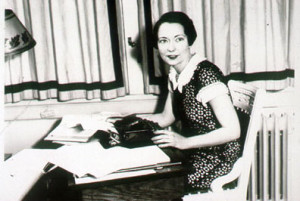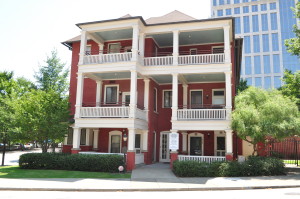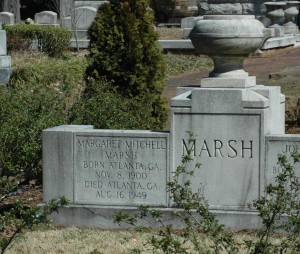Margaret Mitchell (born: November 8, 1900 died: August 16, 1949 is the famous author who wrote the novel, “Gone with The Wind”, about life in the south before, during and after the Civil War. The book was published in 1936 and later the book was made into a motion picture starring Clark Gable and Vivien Leigh and the world premiere was in Atlanta, Georgia in 1939.
I remember seeing the movie when it was re-released into theaters in the 1960s for a limited time. Later, I read the book and enjoy the mixture of history and a wonderful love story. Recently, we have visited Atlanta twice in the last five years. The first time we went to see Margaret’s family home just outside the city which is said to be the inspiration for the home of the O’Hara family in “Gone with the Wind”, the iconic Tara. On our second visit, we went to the Margaret Mitchell House located near downtown Atlanta and is where she wrote the famous novel at a table sitting near the window in her downstairs corner apartment that she affectionately called “the dump”!
Margaret’s paternal family came from Scotland and settled in Georgia in 1777. Her great-grandfather served in the American Revolution and her grandfather enlisted in the Confederate Army and was severely wounded during the Civil War. Later, he owned a lumber company that made a small fortune supplying wood to Atlanta as the city rebuilt after war. Margaret’s maternal great grandfather emigrated from Ireland and eventually settled on a plantation near Jonesboro, Georgia. Her grandfather was a Captain in the Confederate Army and after the war he was a prosperous real estate developer.
Margaret was a born in Atlanta, Georgia. Her father, Eugene Mitchell, was an attorney and her mother, Mary Isabel Stephens, was a suffragette and a very strict disciplinarian. Margaret has a relatively normal childhood but growing up without a sister and only an older brother, Stephens, she was a tomboy who loved to ride horses and very rarely played with her dolls. She was an avid reader who enjoyed the classics, romance and even adventure stories. She had a wonderful imagination and developed a talent for writing short stories and performing in school plays. Margaret grew up listening to stories of the Civil War from her grandmother, great aunts and the old Confederate veterans that would visit her relatives. Her mother would take her on rides through the Georgia countryside where she would see the ruins of the old plantations, some with only their brick or stone chimneys remaining. She became fascinated with the hearing about life in the old South, the Civil War battles and the Reconstruction period after the war. She would remember these stories and use them later when she wrote “Gone with the Wind”.
Margaret attended the prestigious Washington Seminary, a private school for girls in Atlanta, and she soon began using the nickname Peggy. After graduating from the Washington Seminary and despite the objections of her father who believed that women should not receive a higher education, she went to Smith College a private liberal arts college for women located in Massachusetts. By this time, World War I had started and many of her friends went off to fight in Europe, including her brother and her fiancé, Clifford Henry. Sadly, in the fall of 1918, she received news that Clifford had died and the following year during the Spanish Flu epidemic her mother died. Margaret made the decision to leave college and she returned home to Atlanta to care for her father and brother.
It was now the Roaring 20s with jazz music, gin drinking and flappers. Margaret had made her society debut in Atlanta and she was starting to express herself in some wild ways, at the 1921 Debutante Ball she performed the scandalous “Apache dance” and shocked those in attendance. She was also seeing two men, one named “Red” Upshaw who had recently resigned from the U.S. Naval Academy and was unemployed. The other man was John Marsh, Upshaw roommate. Despite her family’s disapproved, Margaret and Red were married in 1922. (Marsh served as the best man at the wedding) A few months later, suffering physical and emotional abuse due to Upshaw’s alcoholism and violent temper, the couple separated and were divorced in 1924.
After separating from Upshaw, but before the divorce was legalized, Margaret took a job writing articles for the Atlanta Journal. She wrote about a variety of topics ranging from current fashions to the discovery of King Tut’s tomb to interviewing actor Rudolph Valentino. But Margaret’s journalism career was very short and only lasted from 1922 to 1926 when she quit due to an ankle injury.
During and after Margaret’s brief marriage to Upshaw, John Marsh proved to be a very supportive friend. Eventually Margaret and John married on July 4, 1925 and they moved into the downstairs corner apartment (No. 1) in the Crescent Apartment building located near downtown Atlanta. Still recovering from her ankle injury and convalescing at home, Margaret began writing a novel set during the Civil War. She remembered the stories she had heard during her childhood and she extensively researched every detail of life on the plantations and she painstakingly verified specific information concerning battlefield conditions and military techniques along with the history of the old South during the Civil War period. It took her three years to complete the book.
“Gone with the Wind was published in June 1936 and quickly sold one million copies in the first six months. Margaret was awarded the Pulitzer Prize for her novel in May 1937. Even before the book’s publication, Hollywood producer David Selznick had secured the film rights. By popular demand, Clark Cable was cast to play Rhett Butler and after a nationwide search for the actress to play Scarlett O’Hara Vivien Leigh was given the part. Olivia de Havilland played Melanie Wilkes and Leslie Howard played Ashley Wilkes. On December 15, 1939 the movie premiere of “Gone with the Wind” was held at the Loew’s Grand in Atlanta. The film received ten Academy Awards including Best Picture, Best Screenplay, Best Actress to Vivien Leigh and Best Supporting Actress to Hattie McDaniel who played Mammy. McDaniel was the first Africian American to win an Oscar.
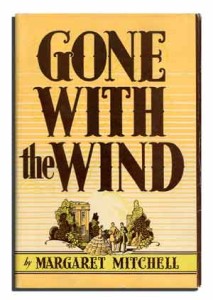
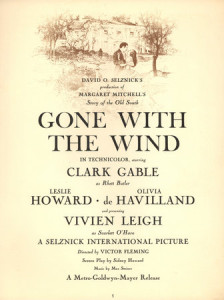
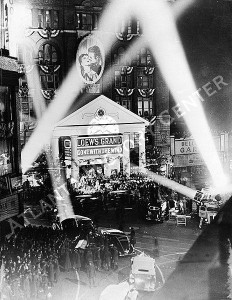
On August 11, 1949 while Margaret and John were leaving a restaurant on the way to see a movie near their apartment, Margaret was hit by car while crossing the Peachtree Street. She was taken to nearby Grady Hospital and died five days later without regaining consciousness. She is buried in Atlanta’s Oakland Cemetery.
Margaret Mitchell’s novel had been translated into over forty languages and remains one of the best-selling books of all time. The movie is a great commercial success and still remains popular worldwide almost 75 years later.

